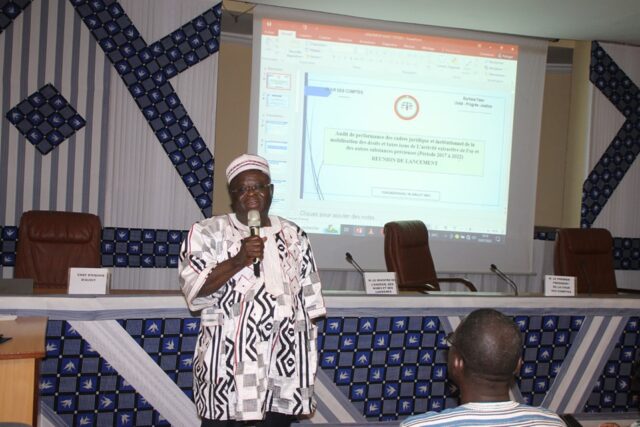On 18 July 2023, the Burkina Faso Court of Audit launched an audit on illicit financial flows in the extractive sector. The subject of the audit is: “Performance audit of the legislative and institutional frameworks for the mobilisation of duties and taxes arising from the extractive activity of gold and other precious substances (period from 2017 to 2022)”.
In the words of First President Latin Poda: “By choosing to focus its audit on mining revenues, the Court of Auditors wishes to question the coherence and robustness of the legal, institutional and organisational backbone of the mobilisation system, and its ability to counter illicit financial flows”.
The Court of Auditors fulfils a commitment made to its African peers
This audit is the result of a community approach carried out in coordination with the peers of the African Organisation of Supreme Audit Institutions (Organisation africaine des institutions supérieures de contrôle des finances publiques – AFROSAI), which decided to provide a regional response to common challenges. This common vision has led to the creation of a Commission and a working group responsible for emerging issues, including the fight against IFFs. As a result, the Court of Auditors has undertaken to conduct a cooperative regional audit of IFFs.
Latin Poda pointed out that the launch meeting on 18 July 2023 : ” is primarily an information meeting, the aim of which is to present the audit project, its main objectives and criteria, and to once again ask for your support in meeting the challenge of its effective and diligent implementation. We hope that when the time comes to take stock, the Burkina Faso Court of Auditors will make recommendations that will help to establish better financial governance in the mining sector”.
Why an audit of IFF in the mining sector?
According to the report entitled “Mining taxation in Africa: a review of the gold sector in 14 countries from 1980 to 2015”, published by the Foundation for International Development Studies and Research, Burkina Faso is Africa’s 5th largest gold producer. “While this windfall makes the extractive sector one of the most promising areas for improving public finances, it could also be one of the most important areas for illicit financial flows, given the lack of surveillance, processing, transport, storage and telecommunications systems”, explained the First President of the Court of Audit. For Latin Poda, these illicit financial flows stem from practices designed to increase companies’ real profits by avoiding taxation. He cited the techniques used, including tax evasion, breaches of customs tariffs, taxes, duties and revenues, market manipulation, profit transfers, etc.
According to the African Union Commission’s High Level Panel chaired by Thabo Mbiki, in its 2015 report, Africa loses around 50 billion US dollars a year as a result of these practices. Furthermore, according to estimates by the United Nations Conference on Trade and Development (UNCTAD), the loss of revenue attributable to corporate tax avoidance schemes in developing countries is close to the amount of official development assistance (ODA) received by these countries.
The scale of this tax shortfall highlights the urgent need to rethink concepts and procedures. “This is why the Court of Auditors felt it appropriate to examine the way in which the systems for collecting duties and taxes from the extractive sector operate”, concluded Matin Poda.
Pierre Balma
#Mines_Actu_Burkina










